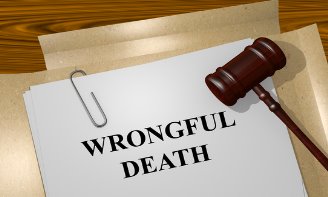Practice Areas / Wrongful Death
Wrongful Death Lawsuits

Overview
A Wrongful Death claim is a lawsuit filed when someone’s death is caused by the negligence or misconduct of another party. For example, a Wrongful Death claim might be filed against a car company who manufactured parts that malfunctioned, resulting in the death of a person or people. Other common Wrongful Death suits can include cases against someone convicted of murder, a negligent medical facility and even medical malpractice in a hospital.
Who Can File A Wrongful Death Lawsuit?
Wrongful Death lawsuits are generally filed by the decedent’s survivors (immediate family – spouses, children, parents) in order to generate compensation for the losses they, and other family members, experience. These losses can include medical expenses prior to the death, the loss of income and funeral expenses.
Additionally, someone unrelated to the decedent who experiences a financial hardship as a result of their death also has the right to bring forth a Wrongful Death claim.
For example, if the decedent was financially supporting or caring for someone, and that person experiences financial suffering from losing that care and support, they may be entitled to file a Wrongful Death claim.
One factor that can alter who can file a Wrongful Death claim is whether or not the decedent had a will. If a will exists, and there is a named executor of that will, generally the court will appoint that person to bring forth the claim on behalf of everyone else who has been affected by the death.
Proving Wrongful Death
In order to prove Wrongful Death, the plaintiff needs to prove that the defendant was negligent and that negligence caused the death. In order to do this, there are three basic elements that must be proven in order for the court to award damages:
- Causation
There must be proof of a direct correlation between the actions of the defendant and the death, whether or not the law has been broken. Simply breaking the law is not enough to prove the defendant is at fault for causing the actual death.
- Duty of Care
The plaintiff must prove that the defendant had an obligation to maintain certain levels of safety prior to the death. For example, in a medical malpractice case involving the administration of medicine the decedent had a known allergy to, the plaintiff must prove the defendant (the hospital) had a duty to take all precautions with regard to medical needs, including allergies. This could include thoroughly examining the patient’s records to learn of known allergies.
- Breach of Duty of Care
With regard to the example above, the plaintiff must prove that the defendant failed to adhere to the required duties of thoroughly examining the patient’s records prior to administrating a medicine that was a known allergy.
Damages Awarded In Wrongful Death Cases
There are generally three types of damages that are awarded on Wrongful Death cases. These are economic damages, non-economic damages and punitive damages.
Economic Damages
Economic damages are awarded to compensate the survivors for any financial contributions the decedent would have made if they had not died. These can include:
- Medical expenses related to the death
- Funeral expenses
- Lost wages that would have gone to support family members
- Loss of medical coverage
- Loss of pension plans
- The loss of an inheritance that became void by the death
Non-Economic Damages
Non-economic damages are the damages awarded to the survivors that have no inherent dollar value, but are given a dollar value in order to compensate for the loss (as best as possible). These damages can include:
- Compensation for pain and suffering
- Compensation for emotional distress
- Compensation for the loss of care and companionship
Time Limitations To File
If you’ve experienced the death of a loved one as a result of someone else’s misconduct or negligence, you probably want to look into your options for filing a Wrongful Death case.
Due to the deadlines established by the courts for filing a Wrongful Death lawsuit, it is advised to contact a reputable, experienced personal injury lawyer as soon as possible to discuss your potential case.


